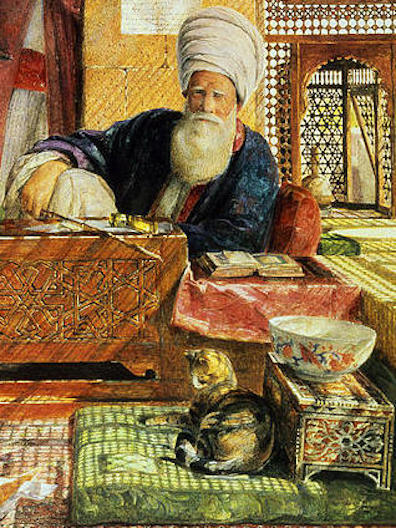When Bloom sees a cat basking on the warm window sill of a
house, he recalls that "Mohammed cut a piece out of his mantle
not to wake her." Mantle here means a cloak or robe, not the
fireplace ledge (sometimes spelled the same way) that could be
called up by the image of the "warm sill." The story, one of
many thousands of hadith, traditional reports of the
words and deeds of the Prophet, holds an obvious appeal for
Bloom, who likes cats and has just thought, "Pity to disturb
them."
The best-known anthology of hadith is the Sahih
al-Bukhari, compiled by a Persian scholar named
Muhammad al-Bukhārī in the 9th century and revered by Sunni
Muslims. It has several passages referring to a woman who was
put in Hell because she imprisoned a cat until it died of
hunger, but none about the Prophet's act of kindness. Other
9th and 10th century collections, however, report that
Muhammad's favorite cat, Muezza, was sleeping on his robe one
day when the call to prayer came. Instead of waking her, he
cut off the sleeve of the robe. Islamic texts contain many
other encouragements to be kind to cats.
Bloom's sympathetic impulse toward this cat counts not only
as one more instance of oriental exoticism in Lotus Eaters,
but also as one more meditation on lotus-like states of
blissful relaxation. Indeed, nearly all of Bloom's thoughts of
the Mideast in this chapter (Jesus
at dusk, the excluded peri,
Mohammed and his cat) and also the Far East (lazy Cinghalese,
a reclining Buddha,
opium-smoking Chinese) can be read as efforts to project
himself out of his current mental struggles to a place where,
as Stephen thinks in Proteus, "Pain is far."
